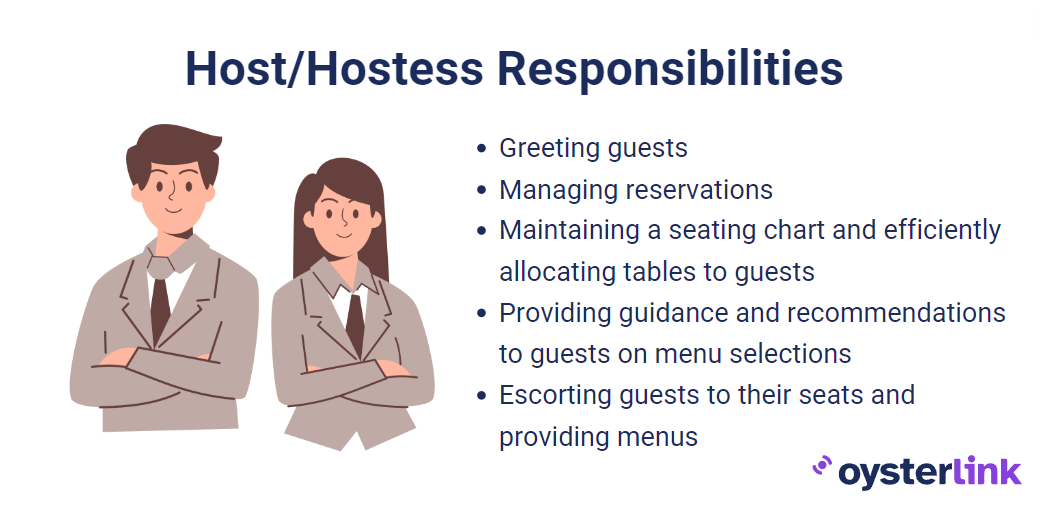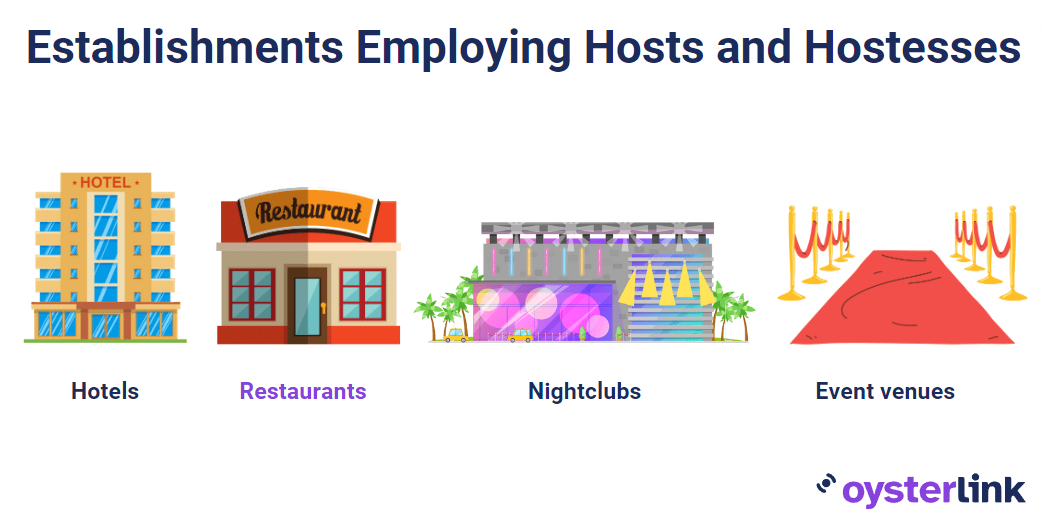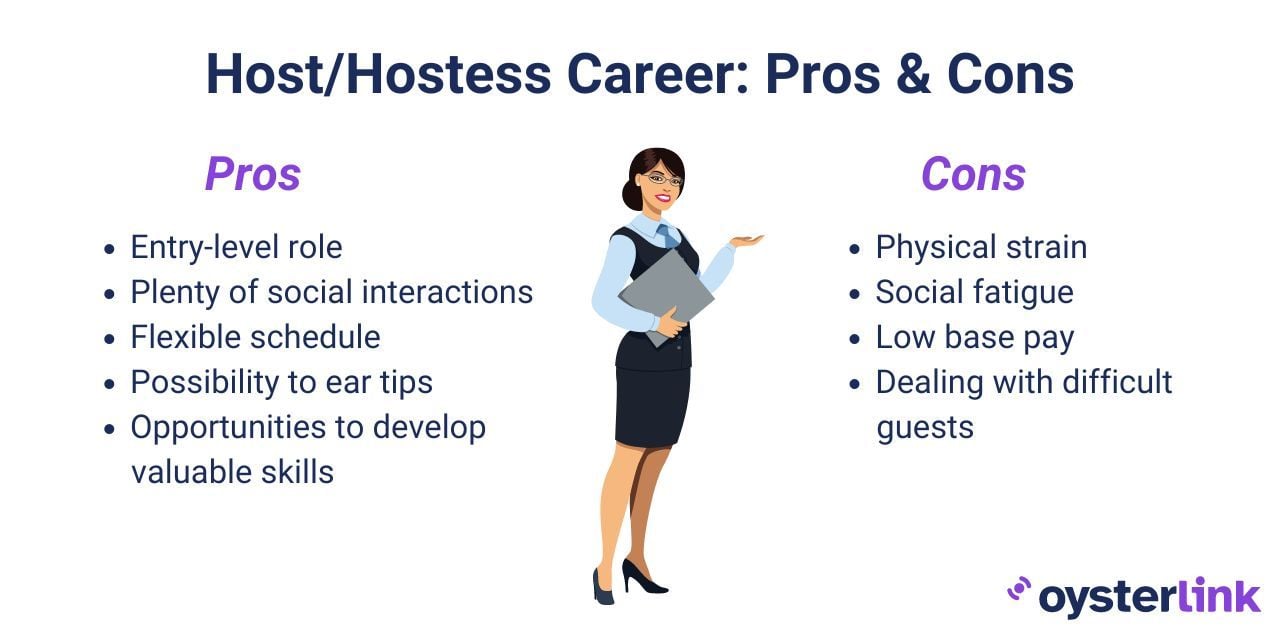Working as a Host/Hostess in a Restaurant
Exploring a Host/Hostess position is an excellent way to enter the hospitality industry.
It offers a front-row seat to customer service and operations, allowing you to develop interpersonal skills and help you understand how to work in high-pressure environments.
If you’re looking for a position that can serve as a stepping stone to other roles in the industry, this Host/Hostess career guide will offer the information you need to help you get moving and succeed.
What Is a Restaurant Host/Hostess?
A Host or Hostess in a restaurant is someone who handles specific front-of-house operations like reservations, waitlists and seating arrangements. They’re the first point of contact for customers entering the restaurant, so they must establish a positive first impression.
Hosts or Hostesses typically work closely with Waiters/Waitresses and report to the Restaurant Manager.
What Does a Host/Hostess Do?
A Host/Hostess handles reservations and waitlists, guides customers to their seats and answer any questions customers may have. Hosts/Hostesses are also typically the ones who hand menus to customers and provide recommendations to help customers decide on what to order.
However, their duties go beyond welcoming guests. They also clean the reception area and help wait staff when needed.
Main Tasks of a Host/Hostess
Even though Hosts/Hostesses tasks can change depending on their level and where they work, their usual ones are:
- Welcoming guests as they come in
- Handling reservations, seating charts and waitlists
- Working with the restaurant team to keep things running seamlessly and get guests seated quickly
- Walking customers to their seats and handing them menus
- Answering any questions guests have and making sure special requests, like dietary restrictions, are considered
- Solving potential problems in the restaurant, such as managing dinner reservation mix-ups
- Suggesting best-selling menu items and limited-time specials to guests once they are seated

Check out our Host/Hostess job description page to explore more about their responsibilities.
Top 3 Host/Hostess Skills and Qualities
Hosts and Hostesses should develop and be equipped with the following skills and qualities that would help them succeed within the hospitality industry:
1. Attentiveness
Hosts and Hostesses need to be attentive, as they’re the go-to people for guests who are about to enter the establishment.
They handle everything from seating arrangements and answering questions to making sure each patron has a great time, all of which require strong organizational skills.
2. Time management and flexibility
Hosts and Hostesses must know how to think quickly on their feet.
Given that their responsibilities include juggling reservations, managing waitlists, and handling unexpected situations — a guest leaving behind a valuable item, for example — they must stay calm and organized at all costs.
3. Teamwork and collaboration
It is no secret that the restaurant is a fast-moving workplace. With many different staff members, this makes teamwork and collaboration an invaluable skill set that Hosts and Hostesses should have.
From relaying important details from guests to the kitchen staff (like specific meal preferences), to notifying servers about VIP guests, they play a key role in keeping everything coordinated and ensuring everyone leaves the restaurant happy and satisfied.
For more tips, read our complete guide on How To Be a Good Restaurant Host/Hostess.
How To Become a Host/Hostess: Education and Training Requirements
When it comes to the educational requirements for Host/Hostess applicants in the United States, employers usually require only a high school diploma or GED.
However, picking up a few courses or acquiring some certifications can help sharpen your skills and qualifications relevant to the hospitality field. These, in turn, are likely to increase your chances of landing a Host/Hostess job.
Here are our recommendations:
- ServSafe Food Handler Certification: This certification ensures knowledge of safe food handling practices, which is critical for upholding food safety standards in a hospitality setting.
- TIPS (Training for Intervention Procedures) Certification: TIPS provides training in responsible alcohol service so you can keep an eye out for trouble and step in early to stop alcohol-related tragedies, such as fights.
- CPR and First Aid Certification: This certification offers essential skills to help you manage medical emergencies like a pro. In a restaurant, falls or slips can occur. As a Host or Hostess, you can offer first aid help by evaluating the guest’s condition and applying an ice pack to their injury.
- Certified Customer Experience Professional: This globally recognized credential is awarded to those who demonstrate expertise in enhancing customer experiences. To obtain this certification, you’ll need to make sure you meet the eligibility criteria laid out by the Customer Experience Professionals Association (CXPA). Then, you'll need to take the CCXP exam and aim for a passing score of at least 70%.
Host/Hostess Wage and Earning Potential
Recent data from the Bureau of Labor Statistics shows that the average base wage for restaurant Hosts and Hostesses in the United States is $14.78 per hour. This translates into an annual base salary of $30,750.
However, some Hosts and Hostesses may earn higher or lower than the national average based on factors like their geographic location, experience and the type of establishment they work for.
Some are also be able to effectively negotiate higher pay and comprehensive benefits that boost their overall earnings.
Learn more about how to maximize your earning potential in this role with our Host/Hostess Salary Guide.
Where Do Hosts and Hostesses Work?
Hosts and Hostesses work in a variety of settings, ranging from high-end restaurants and cozy cafes to prestigious hotels, event venues and nightclubs.
The duties of a Host or Hostess tend to differ based on the establishment they work in. However, their main focus is always on delivering top-notch customer service and making sure guests have a good time.

What Is the Workplace of a Host/Hostess Like?
The Host/Hostess workspace is often demanding and fast-paced, especially during peak hours. Hosts and Hostesses often stand for long periods as they welcome guests, escort them to their tables and ensure efficient running of operations.
The atmosphere can be often chaotic, so they need to stay alert and organized to handle various tasks simultaneously.
Pros and Cons of Being a Restaurant Host/Hostess
Being aware of the advantages and challenges of working as a Host or Hostess can help you decide if this role suits your career goals and personal interests.
To paint you a clear picture of what to expect before you dive in, let’s walk through some of the most usual pros and cons of this particular restaurant position:
Pros:
- Entry-level role: The Host/Hostess role is accessible to individuals with minimal experience. That said, it makes a great starting point if you’re looking to get a head start in the hospitality industry. It offers a chance to learn on the job, gain valuable skills, and potentially advance to more specialized or higher-level positions within the industry.
- Plenty of social interactions: Hosts/Hostesses interact with dozens of people on a daily basis. This way, they get to enhance their communication and interpersonal skills. Moreover, the frequent social interactions they experience with dozens of people every day also open a plethora of chances to grow their professional network.
- Flexible schedule: Host/Hostess positions often offer flexible scheduling options that can help you tailor your work hours to better fit their personal lives. This flexibility can be especially beneficial for those who have other commitments, such as school or caring for a family member.
- Opportunity for tips: Besides the base pay, Hosts and Hostesses may receive tips from satisfied guests. Think of these tips as an additional reward for good service, essentially putting extra cash in your pocket for a job well done.
- Skills development: The Host/Hostess role provides opportunities to develop valuable skills such as customer service, multitasking and time management. For example, mastering customer service skills teaches you how to interact effectively and politely with individuals, which is an asset in any job.

Cons:
- Physically demanding: Hosts and Hostesses are typically on their feet throughout their shift, moving around the dining area and greeting and seating guests.
- Social fatigue: Given all the socializing that comes with being a Host/Hostess, the role can be overwhelming if you're not ready for that level of interaction on a regular basis.
- Low base pay: While tips can add to the total income, the average base salary for this role tends to be on the lower end of the spectrum, especially when compared to those for other roles within the restaurant industry. Chefs and Restaurant Managers make much more money, for example.
- Dealing with difficult guests: Occasionally, Hosts and Hostesses may need to deal with unhappy guests, which requires patience and conflict resolution skills.
